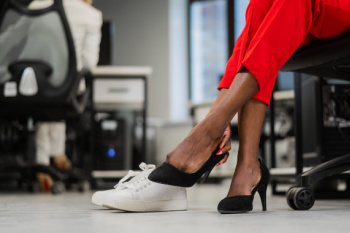
The impact of wearing high heels may profoundly affect the feet. Recent studies explore the potential consequences of prolonged high heel use. Wearing high heels over an extended period can lead to increased energy expenditure and less efficient walking mechanics. The key issue for runners is the restriction of ankle dorsiflexion, the movement that allows your shinbone to pivot over your foot. This limitation not only shortens hip extension and stride but also interferes with the smooth activation of your calf and other muscles during walking. These findings align with the perspective of those advocating for minimalist shoes, emphasizing the influence of any heel, regardless of its size. When it comes to the frequency of high heel usage for runners, the ideal recommendation is to avoid prolonged periods of wear. Occasional use for short durations, such as a few hours at social events, is considered less concerning. However, habitual use during extended periods such as office hours or weekends may bring about lasting changes in biomechanics. Balancing style with foot health involves making informed choices to ensure optimal comfort and functionality for your feet when you run. It is suggested that you consult a podiatrist for guidance about the long term dangers of wearing high heels.
High heels have a history of causing foot and ankle problems. If you have any concerns about your feet or ankles, contact one of our podiatrists from New England Foot and Ankle. Our doctors can provide the care you need to keep you pain-free and on your feet.
Effects of High Heels on the Feet
High heels are popular shoes among women because of their many styles and societal appeal. Despite this, high heels can still cause many health problems if worn too frequently.
Which Parts of My Body Will Be Affected by High Heels?
- Ankle Joints
- Achilles Tendon – May shorten and stiffen with prolonged wear
- Balls of the Feet
- Knees – Heels cause the knees to bend constantly, creating stress on them
- Back – They decrease the spine’s ability to absorb shock, which may lead to back pain. The vertebrae of the lower back may compress.
What Kinds of Foot Problems Can Develop from Wearing High Heels?
- Corns
- Calluses
- Hammertoe
- Bunions
- Morton’s Neuroma
- Plantar Fasciitis
How Can I Still Wear High Heels and Maintain Foot Health?
If you want to wear high heeled shoes, make sure that you are not wearing them every day, as this will help prevent long term physical problems. Try wearing thicker heels as opposed to stilettos to distribute weight more evenly across the feet. Always make sure you are wearing the proper shoes for the right occasion, such as sneakers for exercising. If you walk to work, try carrying your heels with you and changing into them once you arrive at work. Adding inserts to your heels can help cushion your feet and absorb shock. Full foot inserts or metatarsal pads are available.
If you have any questions please feel free to contact one of our offices located in Chelmsford and Newburyport, MA . We offer the newest diagnostic and treatment technologies for all your foot and ankle needs.
